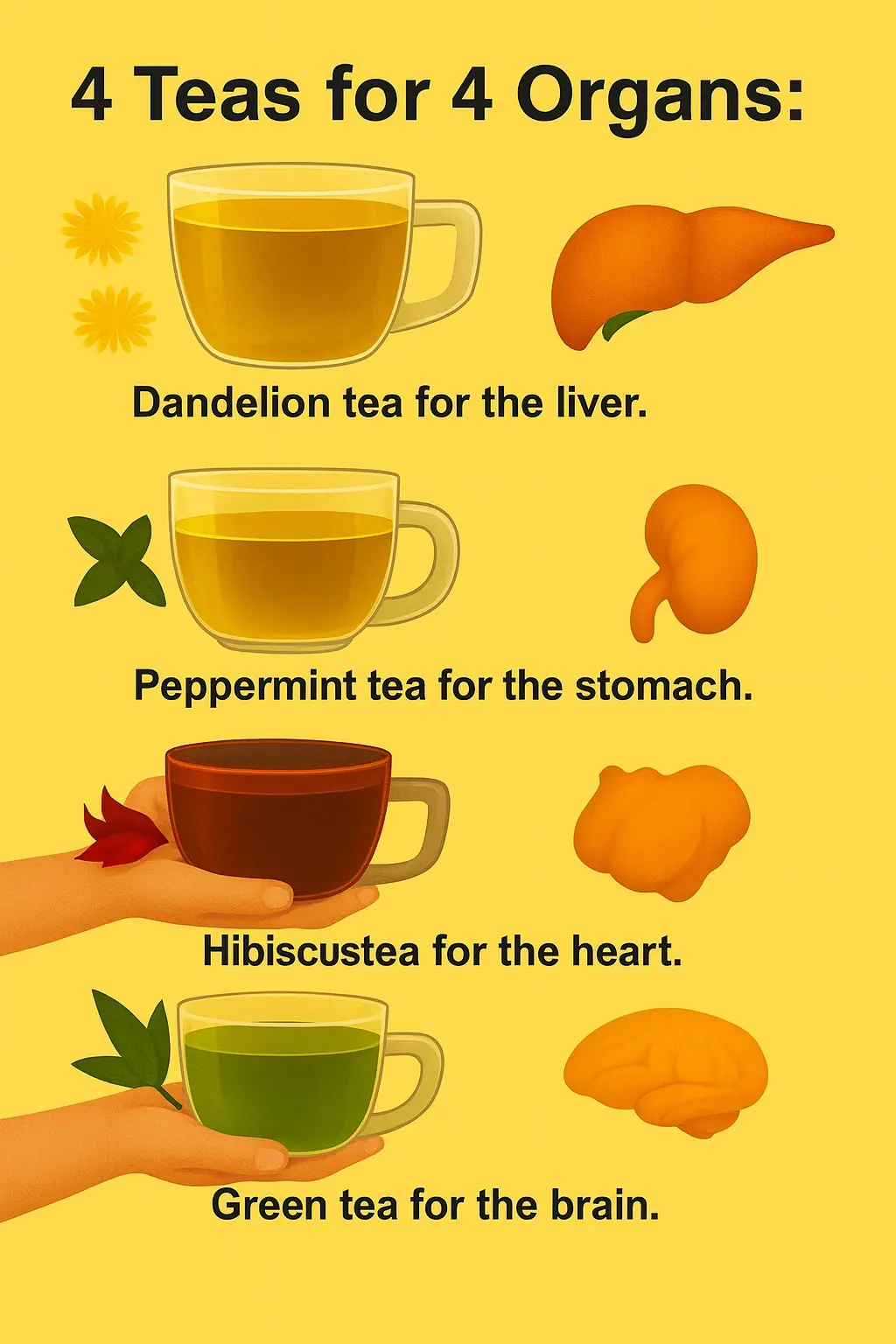
Nature offers us a vast apothecary of healing herbs. Herbal teas are not only comforting and delicious but also come with impressive health benefits for specific organs. The image titled “4 Teas for 4 Organs” presents a simple yet powerful guide to support your body naturally. Here’s a breakdown of each tea and its role — plus three more amazing plant-based allies for your health.
🍵 1. Dandelion Tea – For the Liver
Organ supported: Liver
How it helps: Dandelion root tea is a well-known liver tonic. It helps stimulate bile production, which assists in detoxifying the liver and improving digestion. Rich in antioxidants and vitamins A, C, and K, dandelion supports the liver in breaking down toxins and metabolizing fats.
🍵 2. Peppermint Tea – For the Stomach
Organ supported: Stomach
How it helps: Peppermint tea is soothing for the entire digestive tract. It can help relieve bloating, gas, indigestion, and nausea. The menthol in peppermint acts as a muscle relaxant, reducing spasms in the stomach and intestines, making it an ideal after-meal tea.
🍵 3. Hibiscus Tea – For the Heart
Organ supported: Heart
How it helps: Hibiscus tea is packed with antioxidants and is especially known for its ability to lower blood pressure. Studies have shown that regular consumption of hibiscus tea can improve heart health by reducing LDL cholesterol and supporting healthy blood vessels.
🍵 4. Green Tea – For the Brain
Organ supported: Brain
How it helps: Green tea contains L-theanine and caffeine, a powerful combination for mental clarity, alertness, and focus. It also contains catechins, which have neuroprotective effects and may help slow cognitive decline with age.
🌿 Plus 3 More Plants That Heal:
🌸 5. Chamomile – For Relaxation and Sleep
Chamomile tea is best known for its calming effects. It reduces anxiety, helps with insomnia, and soothes the digestive system. Its gentle sedative properties make it perfect before bedtime.
🌼 6. Ginger – For Inflammation and Immunity
Ginger tea is anti-inflammatory and great for boosting the immune system. It helps relieve nausea, fights colds, and supports joint health. It also improves circulation and warms the body.
🍃 7. Tulsi (Holy Basil) – For Stress and Adrenal Support
Tulsi tea is an adaptogen, meaning it helps the body adapt to stress. It supports adrenal function, reduces cortisol levels, and boosts energy without the crash. It’s also great for respiratory health.
⚠️ Precautions and Notes:
While herbal teas are generally safe and beneficial, it’s important to keep the following in mind:
Consult a healthcare provider – Especially if you are pregnant, nursing, taking medications, or managing a chronic condition.
Allergies – Some herbs like chamomile (a member of the ragweed family) may trigger allergic reactions in sensitive individuals.
Dosage matters – Drinking large amounts of certain herbal teas daily (like dandelion or green tea) could have side effects or interact with medications.
Not a substitute for medical treatment – Herbal teas support wellness but should not replace professional diagnosis or therapy when needed.
Use high-quality herbs – Choose organic, non-GMO sources and avoid artificial flavorings or additives.
Conclusion
Herbal teas are more than just warm comfort drinks — they’re ancient remedies backed by modern science. Whether you’re looking to support your liver, stomach, heart, brain, or reduce stress and inflammation, nature has a brew for you. Try rotating these teas throughout the week to give your body the full-spectrum support it deserves!








































